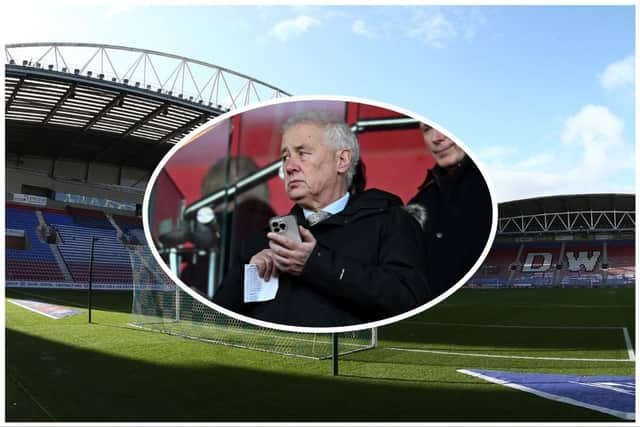New regulator 'could help prevent another Wigan Athletic near miss', says EFL chief
and live on Freeview channel 276
The Football Governance Bill, which will establish the regulator in law, was introduced to Parliament on Tuesday.
Speaking to EFL reporters in a Zoom briefing, Parry believes football has 'sleepwalked' into this position, where it desperately needs an independent body to get involved.


Advertisement
Hide AdAdvertisement
Hide Ad"There are six clubs that have been in the Premier League forever," he said. "Luton Town have become the 51st club to make it in there...and once clubs get up there they want to stay in there, which is entirely understandable.
"It is very difficult to get a shift in mind and mentality without independent input. Expecting two disparate organisations to decide on what is best for the game is not going to happen. We've had 30 years to address this, and you only need to look at the scale of the problem.
"In the first year of the Premier League, the turnover of the Premier League was £45million, and the turnover of the EFL was £34million - so only an £11million gap.
"The EFL's turnover was 75 per cent of the Premier League, which was bridgeable. The gap is now £3billion.
Advertisement
Hide AdAdvertisement
Hide Ad"The turnover of the EFL is now six per cent of the Premier League. The turnover of the Premier League has gone up 70 times, and the EFL's has gone up five and half times.
"Football, collectively, has kind of sleepwalked into this position, and the gulf is so big...we don't just need a touch on the tiller, we need an absolutely fundamental reset...and it's really difficult to do that voluntarily."
Parry acknowledged 'the biggest challenges, and the biggest inequities come in the Championship' - which caused Wigan Athletic to be placed into administration by then-owners IEC in the summer of 2020.
“We think our current owners and directors tests are pretty robust, they have definitely improved over the years,” he said. “But regulators will have greater statutory powers, criminal prosecutions for people who make false declarations etc, so the tests will be sharper. But I think the most important thing is that we get a fairer redistribution of revenues.
Advertisement
Hide AdAdvertisement
Hide Ad"The government has talked about Bury and Macclesfield, but we tend to talk just as much about Derby, Reading, Bolton, Wigan.
"The biggest challenges, and the biggest inequities come in the Championship, and they flow from the need for clubs to try and compete with the parachute clubs.
“You have parachute clubs receiving £50-odd-million, wage bills of £60-80million, all the other clubs receiving £10million in central funding, losing £15million a year, trying to compete with wage bills of £30million or less.
"It is no surprise that in each of the last six years, two of the three promoted sides have been parachute clubs - and that is where the major tension arises.
Advertisement
Hide AdAdvertisement
Hide Ad“If you look at what happened at Wigan, Derby or Reading, it isn’t that the owners came in with bad intentions, or they were bad owners.
"In each case, lots of money has gone into the clubs, chasing the dream, but it gets to the point where either the owners cannot continue funding, or they don’t want to. And it leaves the clubs high and dry.
“What the regulator will do – and we have never been able to do – is they are going to require some guarantees, some bonds, some assurances that the funding will be in place, so they can’t just turn the tap off.
"Fans really want to know that their club is going to be financially sustainable and will exist in the long-term, and that is where the big benefit comes.
Advertisement
Hide AdAdvertisement
Hide Ad“The regulator is not going to do one-off tests, but periodically, to make sure they are still fit and proper, making sure they are honouring their commitments and putting the funding in that they said they would put in.
"If they don’t, they have the ability to tell them to divest, and to put in trustees to actually run the club in the meantime. They will have powers we don’t currently possess.”
But would the new legislation have prevented clubs like Latics from teetering on the brink - and in Bury's case, actually falling into the abyss?
“It's not a simplistic solution,” added Parry. “And the regulator is not going to be able to wave a magic wand overnight. The whole system has to change.
Advertisement
Hide AdAdvertisement
Hide Ad“One of the problems with Bury and Bolton - at least until the new consortium came along - was there wasn’t a queue of new owners wanting to jump in, because of all the financial challenges in the Championship.
“When you are told after talking over a club, you must be writing out cheques straight away for £15million a year just to stand still and survive, there isn’t an enormous pool of people who are willing to do that.
“Again, the redistribution and reducing the dependence on owner funding, going hand in hand with the owners and directors, becomes really important.
"One of the points we've made to government recently is it's brilliant to have a new licensing system, brilliant to look at the solvency of clubs, but actually losing £15million a year just because redistribution isn’t sorted. All we are going to do is find out half the clubs are insolvent, so what happens then?
Advertisement
Hide AdAdvertisement
Hide Ad"Does the regulator just not licence them? That can’t be the answer, because that just puts them out of existence.
“So unless we get the redistribution right, hand in hand...you can’t have a partial solution. It is a total picture.
“That's not to say you want to stifle ambition, or investment, but it’s a big, big reset that’s necessary, not tinkering around the edges. It’s a game-changer...a very big step. But it’s one we welcome.”
